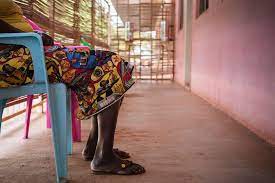APA-Bangui (CAR) Between 2018 and 2022, Médecins Sans Frontières (MSF) treated more than 19,500 survivors of sexual violence in the Central African Republic (CAR), nearly 60 percent of the total number of people who received treatment for sexual violence in the country over that period.
The number of people MSF treated in 2022 for sexual violence tripled compared to the number our teams treated in 2018.
These striking figures comes as MSF releases a new report on sexual violence in CAR, urging the government and humanitarian organisations to take action to address the crisis, including providing expanded medical and psychological support to survivors.
“Sexual violence in CAR is a taboo public health emergency and cannot be solely addressed as an armed conflict-related problem”, says Khaled Fekih, MSF country director in CAR.
“Despite some positive developments over the past five years, many survivors of sexual violence don’t report their cases and don’t seek treatment.”
“We know the number of patients seen is still just the tip of the iceberg,” Fekih continues. “More concrete actions are needed by both the CAR government and other national and international humanitarian organisations to change this situation.”
In the report “Invisible Wounds”, MSF analyses quantitative data from a dozen projects and emergency interventions we support or run in CAR. While an increasing number of survivors of sexual violence (95 percent of whom are women) have had access to assistance over the last five years, many gaps in treatment remain.
These include basic and comprehensive medical care, initial psychosocial support, and sophisticated psychiatric care for complicated cases. Survivors also lack access to protection as well as socio-economic and legal support.
“Patients face many barriers to seeking care in a timely manner, including fear, lack of transportation means or resources, and ineffective care pathways,” says Liliana Palacios, MSF health adviser.
“In some locations, MSF received patients who had travelled 130 kilometres, which can mean very long hours or even days of travel because of the poor state of road networks in CAR.”
“At times, patients sought care only years after suffering the aggression,” says Palacios.
Sexual violence in CAR goes far beyond the long-running conflict.
MSF’s five-year analysis found a minority of assailants were armed (approximatively 20 per cent) and the vast majority of them were well-known to the survivor (approximatively 70 per cent).
Unfortunately, very few perpetrators are convicted because of flagrant impunity, while survivors face acute stigmatisation and other significant obstacles to continue normal life in their community.
To help them reintegrate into society and not be penalised when they seek help, survivors of sexual violence need access to legal support and socio-economic assistance.
“A much stronger collective and holistic approach is needed to do more, faster and better,” says Fekih.
“It must be a survivor-centred approach based on confidentiality, empathy, and respect.”
WN/as/APA


